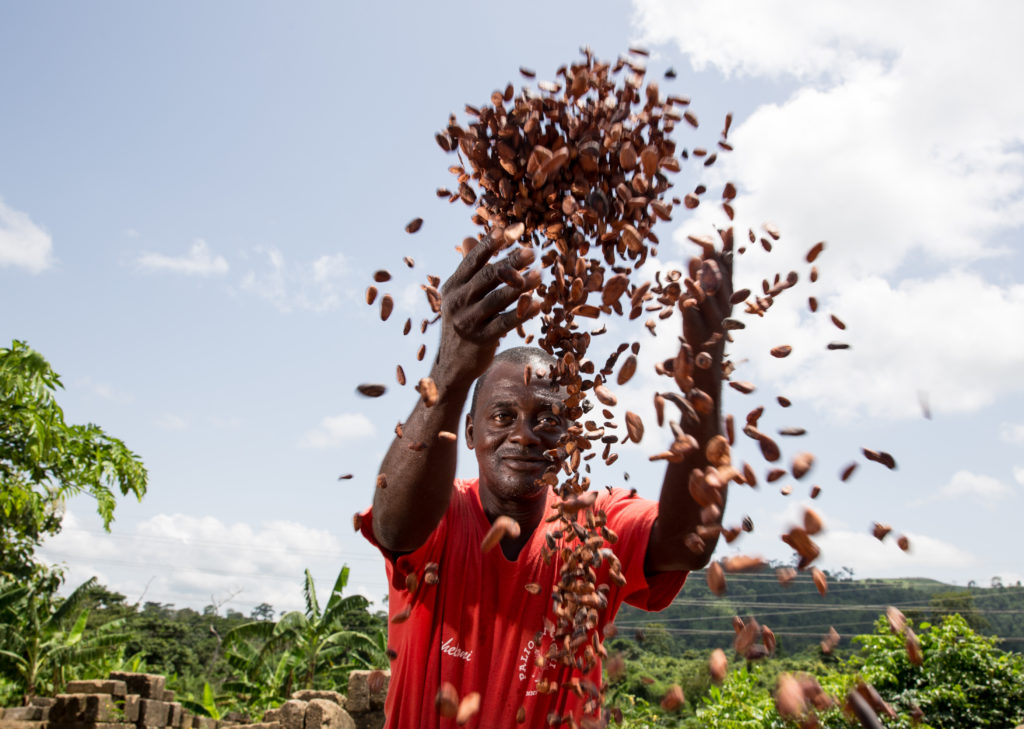
Farmerline strives to connect small-scale farmers to information services, inputs, and resources to transform them into successful entrepreneurs.
 Name: Farmerline
Name: Farmerline
Location: Ghana, West Africa
Website: farmerline.co
Product / Service Offering: Transform small-scale farmers into entrepreneurs
Co-founder Interviewed: Alloysius Attah, CEO and Co-founder
Other Key Management Team Members: Emmanuel O. Addai, CTO and Co-founder
This article is part of our Business Startup Spotlight series featuring entrepreneurs and their companies. We hope that these founders’ interviews will inspire and motivate you as you undertake your own entrepreneurial journey.
Tell us a little about yourself with a focus on what motivates you.
While living with my aunt, who was a small-scale farmer in rural Ghana, I experienced first-hand the challenges that small-scale farmers go through to produce food, as well as support their families. After college, I became determined to give back to all the smallholder farmers who supported me. This drive, together with my co-founder, is what led to the creation of Farmerline, Ltd. in 2013. I have a committed focus to empower small-scale farmers, like my aunt, who are all facing similar challenges across Africa.
My motivation comes from a passion to grow a strong sustainable company that employees and their families, clients, partners and supporters can rely on. I want to stand as a company that does good in the community. We want to make a huge difference by leaving the world better than we found it. Farmerline empowers the smallholder farmer to become a successful entrepreneur and is an example of a sustainable organization within the community. I want Farmerline to be a legacy.
When did you establish your company and where did the idea originate?
We established Farmerline in 2012 but launched in 2013. This venture began after realizing the vision of empowering smallholder farmers to become more prosperous through direct access to agricultural information. I had years of direct farming experience; therefore, I recognized the potential of ICTs to solve many challenges. This is one of the main reasons why smallholder farmers in rural communities in Africa are our primary beneficiaries.
The Difference Between a Vision and a Mission
What need or needs does your company seek to fill for its customers?
We strive to connect small-scale farmers to information services, inputs, and resources to transform them into successful entrepreneurs.
What is the one thing that sets your company apart from its competitors?
Our competitive advantage lies in the fact that we are able to determine a price point that makes our products directly accessible to farmers, who can then pay for our services themselves. It’s an open marketplace where farmers will get more options and pay less. The pricing structure for our data and analytics platform meets the budgets of organizations of all sizes and scale.
Another advantage is that our proprietary technology is particularly suited to the needs of small-scale farmers. Nearly half of African farmers cannot read or write, and we became the first on the African continent to provide outgoing agriculture information to farmers in their local languages using voice.
What was the biggest challenge you faced while getting your company up and running, and how did you overcome it?
At the start, we knew that our customers in Africa have limited disposable income. As such, it was challenging to incentivize farmers to pay for services themselves and to renew their subscription annually. We regularly develop cutting-edge content to maintain the value. To date, we have seen promising results in response to this approach. Our retention rates have exceeded our expectations and the expectations of our partner organizations.
Are there resources you have utilized that other founders might find compelling or useful?
One of the compelling things we have done is commit to building internal capacity and unleash the genius of each employee. Many team members join the company as new graduates. At Farmerline, we cultivate strong leaders, “entrepreneurs-in-training”, who manage critical parts of our business. This talent evolution occurs because of a deep belief in the potential of each team member and an internal culture of mentorship across skill sets. Team members teach one another skills ranging from application development and product design to soft skills like managing clients with exceptional care and customer success.
To maintain our mission, values, and culture as we scale, we created a series of tools to aid employees in setting their own personal goals for performance and professional development. We recognize that being truly innovative requires constant experimentation across all functions.
The Perfect Entrepreneurial Team
What steps have you taken to secure funding for your company and what, if anything, would you do differently if you had to start over?
Our primary business line involves licensing our SaaS to medium / large organizations and associations who work with networks of farmers. We customize the platform’s services to meet their needs and through these partners reach hundreds of thousands of farmers.
A second business line for us is reaching farmers through direct sales, B2F. Due to high farmer demand for our services, increasing mobile and mobile money penetration, Farmerline is now increasing focus on this B2F model to serve farmers outside the reach of B2B partners.
The last business line is reaching farmers with added financial services to increase farmers’ access to savings and loans. These financial inclusion tools are highly in-demand by farmers and, increasingly, financial institutions. There is a significant gap in communication and data to facilitate these transactions. Farmerline is well placed to bridge this gap with its improved platforms, services, and de-risking of farmers.
Across each business line, Farmerline offers products and services for farmers
- agronomic tips
- weather data
- financial literacy
- market prices
and to the value chain
- surveying
- inventory tracking
- cataloguing and payment
- as well as other customized tools adapted to customer needs
Through these business lines, products, and services, Farmerline has developed a profitable business model driven by B2B revenues and B2F sales.
Have there been any questions you have had as an entrepreneur of a fledgling startup that you had a particularly hard time finding the answers to?
I have had a hard time finding the answer to the question of succession planning. I understand that it should be a part of our strategic plan, but I haven’t exactly figured out the key details to this initiative. If there is no succession planning process, how will Farmerline develop and nurture its human capital? How will we assure a continuing sequence of qualified people to move up and take over when the current generation of managers and key people retire or move on? How will we be able to plan for the future of Farmerline without some assurance that the key posts will be filled with people able to carry on and excel?
What challenges, if any, are you grappling with?
As a social enterprise start-up, we must raise the visibility of our products and services within the constraints of a limited marketing budget. To solve this challenge, we rely on testimonials and referrals from our clients and partners.
We also value supplementary marketing opportunities from external companies and platforms for help. We benefit from opportunities like Echoing Green and King Baudouin African Development Prize, which offers financial and in-kind resources, as well as a vote of confidence from a world-renowned brand.
Another challenge is balancing scale with our commitment to collaborating with farmers in the field. We insist on maintaining fidelity to our model as we scale, working with end-users throughout the development process. We have developed a number of internal controls and processes to preserve the integrity of our model as we scale.
In the past, we have also been challenged with getting genuine investors and partners who understand our core business. This is one of the reasons why we have joined the KickStart Accelerator program this year. We believe they will present us with an opportunity to connect with potential clients, partners and investors. Through the many learning opportunities it provides, such as workshops and speed networking sessions, we will have the guidance and resources needed to push our venture forward.
Looking for an accelerator? Check out the Global Accelerator Register
What is the most helpful tip or “hack” you’ve ever learned, stumbled across, or been given?
The best advice I’ve read:
“I strongly believe that missionaries make better products. They care more. For a missionary, it’s not just about the business. There has to be a business, and the business has to make sense, but that’s not why you do it. You do it because you have something meaningful that motivates you.” – Jeff Bezos
Is there anything else you would like to share about your company?
We are laser focused on the needs of the farmer and from there we work out the solutions. Farmerline takes a human-centered design approach – always considering the farmer at every step of the product development process. Our top priority is solving the challenges of our beneficiaries. We are radically committed to excellence. Farmerline iterates and adapts, seeking constant feedback from farmers, agribusinesses, governments, and other stakeholders. We take innovation seriously. Technology is the only way to truly transform the agricultural sector and lift a new generation of farmers out of poverty. Now we are at the forefront of this transformation.
Are you familiar with other startups you believe should be spotlighted? If so, we would like to hear from you. Tell us about them in the comments below!









